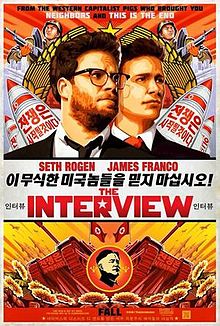The most recent cybersecurity attack, involving Sony Entertainment, has garnered the attention of The United States’ Department of Homeland Security. The cyberattack was conducted by the cyber-faction, The Guardians of the Peace and the group “warned that if its demands were not met, secret data would be shown to the world.”
Experts speculate Sony was targeted due to the corporation’s anticipated release of the Seth Rogen directed & produced film “The Interview.” The cybersecurity breach resulted in the release of over 32,000 emails to and from Sony’s entertainment chief, and revealed sensitive discussions and secret details involving Sony executives and business partners. Furthermore, the cyber-attackers threatened to resort to physical terrorism in response to the planned Dec. 25 opening of the comedy. In response to the threat and in the interest of public safety “The Interview” film was pulled from most major cinemas. However, it will continue to be shown at select cinemas with enhanced security measures.
U.S. federal investigators maintain that the hack is connected to North Korea, and was initiated due to the film’s gruesome depiction of the assassination of Kim Jong-un, the leader of North Korea. North Korea’s leadership voiced its anger concerning the film describing its release as “an act of terrorism.” An unnamed US government source was quoted saying that they believed that the attack was state-sponsored with the North Korean government involved.
In their statement The Guardians of the Peace affirmed:
“We will clearly show it to you at the very time and places ‘The Interview’ be shown, including the premiere, how bitter fate those who seek fun in terror should be doomed to…Remember the 11th of September 2001.”
Former intelligence specialist and cybersecurity expert James Lewis argues, “This is the way the North Koreans make a political point.”
The hack prompted discussion amongst law-makers within Washington, and has given new life to government’s proposed “zombie bill.” The controversial legislation is part of the government’s cybersecurity enhancement agenda. The bill is “intended to help companies and the government work together to thwart hackers through increased data sharing.” The legislation has been met with opposition, as privacy advocates have voiced their concerns over the bill’s broad language and how it could breach the public’s privacy and civil liberties. Law experts maintain this recent legislative activity concerning cybersecurity “indicates a seriousness by policymakers to confront issues vital to information systems protection.”
In response to the attack, the United States government has considered the use of economic sanctions against North Korea. The toughest sanction involves the United States’ restricting North Korea’s dollar-denominated trade by hitting Chinese banks that conduct business with Pyongyang. This action would further isolate North Korea from international markets and subsequently damage the nation’s economic lifeline to food, fuel and weapons.
The response the United States chooses to evoke must be proportionate to the action taken by the aggressor. The U.S. must tactfully employ a reaction that protects its national security interests, and ensures the nation does not become intertwined within another complex international confrontation. Economic sanctions appear to be the United State’s most viable and least lethal response.
Alternatively, the United States could make the choice not to acknowledge the actions of North Korea. By doing so, the United States would convey a message that the cyberattack did not warrant a legitimate U.S. response, thus classifying the act as petty and non-threatening to American interests. This action would send a clear message to North Korea by insulting the integrity of their political institutions and the factions responsible for the attack. Threatening the credibility of the individuals responsible for the attack by not pursuing a defined response might prove to be more effective than imposing sanctions upon North Korea, as national pride and honour are essential elements of that society.




